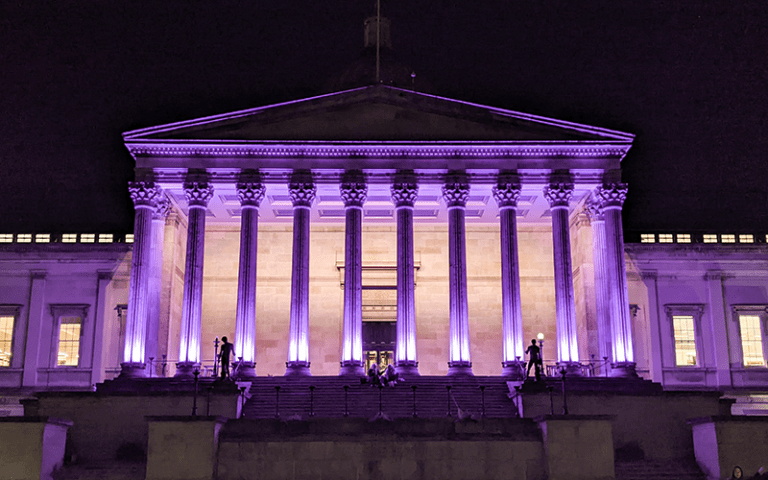UN Genocide Prevention Day: a survivor, teachers and students stand together
By IOE Blog Editor, on 5 December 2024

The stone columns UCL Wilkins building lit in purple to mark Holocaust Memorial Day. Credit: Mary Hinkley, UCL Creative Media Services.
5 December 2024
On Monday 9 December, UCL’s Centre for Holocaust Education marks UN Genocide Prevention Day with a special conversation between a survivor, teachers and students. The roundtable discussion will explore the possibilities that genocide education affords as well as the challenges that tackling such sensitive histories brings.
December 9 sees the anniversary of the adoption of the ‘Convention on the Prevention and Punishment of the Crime of Genocide’. The word ‘Genocide’, coined by Polish lawyer, Raphael Lemkin, combines the Greek prefix ‘genos’, meaning race or tribe, and the Latin suffix ‘cide’, meaning killing. Lemkin, who lost more than fifty members of his extended family during the Holocaust, had been inspired to campaign for a legal instrument that would punish and prevent the ‘crime of crimes’.
The Centre for Holocaust Education’s (CfHE) online session, the latest in its ‘Dialogues in Holocaust Education’ series, seeks not only to mark UN Genocide Prevention Day but also to ensure that a diversity of voices are heard when considering genocide education. Similarly, the roundtable discussion will consider important pedagogical issues regarding the teaching of such sensitive and difficult histories.
Joining us for the event is Sophie Masereka, a survivor of 1994 Genocide against the Tutsi in Rwanda. Sophie regularly speaks in schools and has told her story of survival to hundreds of people. She will relate her miraculous story of survival during the Genocide and also the tragic loss of her father, brother and many other members of her extended family at the hands of neighbours who turned into killers for weeks in Kigali.
Alongside Sophie will be teachers Debbie Hayden and Sara Sinaguglia, both CfHE Beacon School ‘Lead Teachers’. They will address both the challenges and possibilities that teaching about the Holocaust and more recent genocides afford. A lack of resources, curriculum time and subject knowledge present obstacles to many teachers who wish to help their students learn about genocides in Rwanda and Bosnia, for instance. Equally, the opportunity to work with survivors like Sophie enables students to enquire whether the world stayed true to the promise of ‘Never Again’ made after the Holocaust.
Our final guests for the discussion, students from Hampton School, Oak Academy and Trinity Catholic School, have been working on a collaborative project that has seen them speak with survivors from recent genocides and those from communities being persecuted in the world today. After learning about survivor experiences in Rwanda and Bosnia, the students have taken meaningful actions that might contribute to the prevention of future atrocities: raising awareness in their schools, sending messages of support to refugees fleeing from violence, lobbying parliamentarians and fundraising to support communities struggling under the weight of violence around the world. The work reflects the views that the students’ research has brought them to: small actions can make big differences.
UN Secretary-General António Guterres recently remarked:
Ultimately, preventing genocide involves all of society. It is crucial that we all join hands to defend the principles of equality and human dignity and to repair the fissures and polarization that are so prevalent in our societies today.
In just one, short roundtable discussion, survivors, teachers and students will illustrate how it is possible to respond to the Secretary-General’s call to action and how a meaningful contribution to ‘Never Again’ might be made.
 Close
Close



